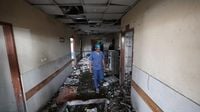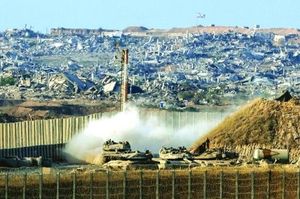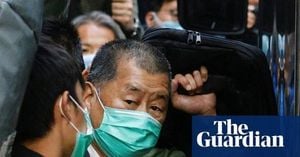In the shadow of Gaza’s devastated hospitals and makeshift clinics, a new and troubling barrier has emerged for those seeking to provide desperately needed medical care: Israel’s increasing rejection of foreign doctors, particularly Americans, who volunteer to serve in the war-torn enclave. As violence continues to claim lives and cripple the region’s health infrastructure, aid groups and international organizations warn that these restrictions are not only impeding humanitarian relief but may also be silencing crucial eyewitnesses to the conflict’s human toll.
The crisis reached a grim crescendo in August 2025, when an Israeli strike on Nasser Hospital in Khan Younis killed five journalists, four medical staff, and a rescue worker, according to NPR. With the unprecedented killing of local journalists and Israel’s near-total ban on foreign press in Gaza, medical personnel have become some of the last remaining international witnesses to the war’s catastrophic effects on civilians. Their testimony, often harrowing and deeply personal, has become a lifeline for those outside Gaza seeking to understand the true scale of suffering inside.
Yet, as Dr. Yassar Arain, a pediatrician from Texas, discovered, even this lifeline is increasingly under threat. Dr. Arain, whose specialty is treating critically ill newborns, volunteered in Gaza last year. The experience, he said, was “terrible and traumatic,” haunting him long after he returned home. But rather than turning away, he felt compelled to go back. After securing approvals from a medical aid organization and the U.N. Health Organization, Dr. Arain took leave from his practice and purchased a ticket to Jordan, the staging ground for many humanitarian missions to Gaza. Then, as he traveled to Amman, he received a text message: his entry had been denied by an arm of the Israeli military, his name crossed out with a red line. No explanation was given. A Jordanian doctor scheduled to enter with him was also barred.
“I had obviously been planning for months on end and then on my way to Jordan, I got a text message saying I was denied,” Dr. Arain told NPR. The abruptness of the denial—after weeks of preparation and official approval—left him and his colleagues reeling. “Those are specialties that are highly needed and if those doctors did not get in, those patients will not get treated. It’s as simple as that,” said Dr. Mustafa Musleh, head of the Palestinian American Medical Association (PAMA).
According to Dr. Musleh, the pattern is clear and worsening. “I would say more than 50% of the doctors that we send end up being denied,” he explained, noting that rejections have sharply increased over the last three months. Applications are typically submitted to the U.N. weeks in advance, but denials are often relayed just four to six hours before scheduled entry, leaving convoys half empty and patients without care. “So this doctor takes four weeks of time off, and then, literally, like, four to six hours before the entry, we get the confirmation of approval or denial,” Musleh said. Last week, an oncologist was among those denied entry—a loss of expertise in a place where cancer care is already nearly impossible.
The World Health Organization (WHO) has echoed these concerns, stating that “complex entry requirements and the arbitrary denial of international medical teams” are directly leading to more Palestinian deaths. Since mid-March, denial rates have risen by about 50%, with at least 102 specialized medical staff blocked from entering Gaza. The WHO estimates that these denials put at risk 4,500 medical consultations per week in the territory.
Israel, for its part, says the entry process is subject to prior security screening. The Israeli military told NPR that it “coordinates entry of dozens of organizations each week in a process subject to prior security screening,” and that it facilitates the entry of medical equipment and supplies while taking “every possible measure” to prevent the militant group Hamas from seizing aid for military purposes. However, aid groups and U.N. officials say Israel has banned medical volunteers with Palestinian heritage and severely restricts what medical staff can bring, allowing only personal medication and a small amount of cash. Items as basic as hospital beds, anesthesia, and water disinfectant tablets are often forbidden, with Israel arguing they could have military uses.
Dr. Mimi Syed, an emergency medicine physician from Washington state, experienced the frustration firsthand. Syed, who had been planning her third volunteer mission to Gaza, landed in Jordan only to be told by her aid group that the Israeli military had rejected her entry without giving a reason. Syed believes her public testimony—including statements to a United Nations commission about treating children shot in the head, rising malnutrition, and deaths from lack of supplies—may have played a role. “It just seems like this is a targeting of certain people who are going to be exposing the truth of what’s happening in Gaza, another way to prevent that,” Syed said.
The emotional toll is immense. On previous missions, Syed befriended a sixth-year medical student in Gaza, maintaining daily contact. When Syed was denied entry, the student sent a voice message that sounded like a farewell, her words punctuated by the sound of drones overhead: “I no longer have any hope. Everything feels over, Mimi. I don’t even want anything from life except death. Because I truly believe I will find peace in it.” Syed was left in tears. “I feel hopeless that I can’t provide anything for her,” she said. “She’s been displaced multiple times. They’re exhausted. They don’t have food. There’s no place to live.”
The barriers to entry are more than bureaucratic. Until May 2024, PAMA was able to send 15 to 20 doctors at a time, each carrying suitcases filled with medication and equipment. But after Israel took control of the Gaza side of the Rafah border crossing in May 2024 and Egypt closed the crossing, the only route in is through Israel, with even stricter controls. Now, even when doctors are approved, they are forbidden from bringing in anything but personal items. “We don’t want to risk them getting denied because of that,” Dr. Musleh said, noting that even attempts to bring baby formula or basic medical tools can result in a ban.
The stakes could not be higher. Gaza’s health system, battered by months of bombardment and siege, faces severe shortages of medicine, fuel, and food. According to the WHO, Israeli strikes have killed about 1,500 local medical staff since October 2023, and many others have been repeatedly displaced. With so many journalists killed and foreign reporters barred, the world relies on the testimony of doctors and nurses for a window into Gaza’s suffering. Their absence, say aid groups, leaves a dangerous void—not just in medical care, but in truth itself.
For Dr. Arain and Dr. Syed, the sense of duty remains undiminished despite the obstacles. “As one of the few witnesses to what was going on in Gaza from the West, it was now time to engage in advocacy and community building,” Dr. Arain reflected. The work, he believes, does not end at the border.
As the war grinds on, the fight to save lives in Gaza is increasingly being waged far from its hospitals—on diplomatic fronts, in the halls of the U.N., and in the hearts of those who refuse to look away.





